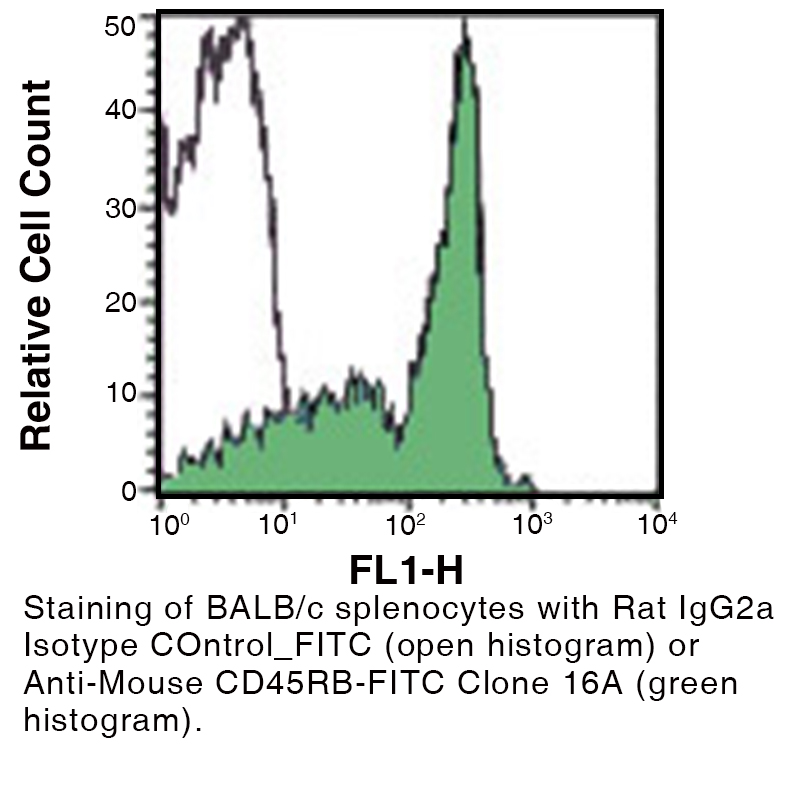Anti-Mouse CD45RB [C363-16A] – FITC
Anti-Mouse CD45RB [C363-16A] – FITC
Product No.: C265
- -
- -
Clone C363-16A Target CD45RB Formats AvailableView All Product Type Monoclonal Antibody Isotype IgG2a Applications FC |
Data
- -
- -
Antibody DetailsProduct DetailsReactive Species Mouse Host Species Rat Product Concentration 0.2 mg/ml Formulation This Fluorescein (FITC) conjugate is formulated in 0.01 M phosphate buffered saline (150 mM NaCl) PBS pH 7.4, 1% BSA and 0.09% sodium azide as a preservative. Storage and Handling This Fluorescein conjugate is stable when stored at 2-8°C. Do not freeze. Country of Origin USA Shipping Next Day Ambient Excitation Laser Blue Laser (490 nm) RRIDAB_2829563 Applications and Recommended Usage? Quality Tested by Leinco FC The suggested concentration for this C363-16A antibody for staining cells in flow cytometry is ≤ 0.25 μg per 106 cells in a volume of 100 μl. Titration of the reagent is recommended for optimal performance for each application. Additional Reported Applications For Relevant Conjugates ? IHC (Frozen) IHC (Paraffin) IP For specific conjugates of this clone, review literature for suggested application details. Each investigator should determine their own optimal working dilution for specific applications. See directions on lot specific datasheets, as information may periodically change. DescriptionDescriptionSpecificity Clone C363-16A recognizes an epitope on mouse CD45RB. Background CD45 is a 180-240kD glycoprotein member of the protein tyrosine phosphatase (PTP) family known for its involvement in regulating a variety of cellular processes including cell growth, differentiation, mitotic cycle, and oncogenic transformation. CD45 and its isoforms are vital regulators of T- and B-cell antigen receptor signaling. CD45 functions through its extracellular domain or through its cytoplasmic domain, and serves as a negative regulator of cytokine receptor signaling via JAK kinase supression. The large extracellular domain is highly glycosylated, and its multiple isoforms allow extensive variation in the structure of its side chains. CD45 isoforms show cell-type and differentiation-stage specific expression that can be used as markers that identify and distinguish between different types of immune cells. CD45R is an isoform of CD45 with a molecular weight of 220 kD. CD45R contains all three possible exons (A, B, and C); making it the longest protein generated from alternative splicing with a migration at 200 kD when isolated from T cells. Furthermore, B cells express CD45R with heavier glycosylation, bringing the molecular weight to 220 kD, hence the name B220. Notably, B220 expression is not only restricted to B cells and may also be expressed on activated T cells, on a subset of dendritic cells, and on other antigen-presenting cells. Additionally, activated and memory T lymphocytes express CD45RO which facilitates T cell activation. CD45RO lacks all three possible exons (A, B, and C), making it the shortest CD45 isoform. Antigen Distribution The CD45RB antigen is present on peripheral B-cells, T-cytotoxic cells, at high density on CD4+ T-cells which secrete IL-2 and at low density on CD4+ T-cells which secrete IL-4.1 Ligand/Receptor Galectin-1, CD2, CD3, CD4, Thy1 PubMed NCBI Gene Bank ID UniProt.org Research Area Cell Biology . Immunology . Inhibitory Molecules . Neuroscience . Neuroscience Cell Markers References & Citations1. Bottomly, K. et al. (1989) Eur. J. Immunol. 19:617
2. Johnson, P. et al. (1989) J. Exp. Med. 169:1179
3. Hatchcock, K. S. et al. (1992) J. Immunol. 148:19 Technical ProtocolsCertificate of Analysis |
Formats Available
- -
- -



